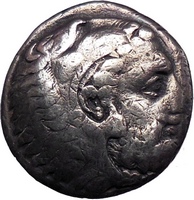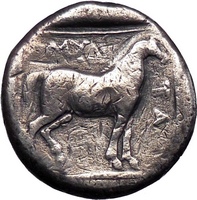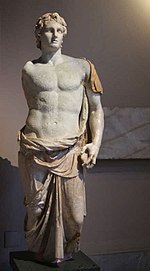Amyntas III Grandfather of Alexander the Great Biography 393-370BC
Ancient Coins Investment


Example of Authentic Ancient
Coin of:
Amyntas III - Grandfather of Alexander III the
Great
Macedonian King: 389-383 and 381-369 B.C.
Silver Didrachm Struck circa 389-369 B.C.
Reference: Sear 1508; B.M.C. 5. 1-4
Head of beaded Hercules right, wearing lion's skin.
AMYNTA above and before free horse standing right; all in linear square
within incuse.
Martin Price, in 'Coins of the Macedonians' (p.21),
makes the interesting suggestion that this type belongs to the reign of
the infant Amyntas IV (359-357 B.C.), for whom Philip II was regent.
This can scarcely be considered proven, however, and the style of the
coins seems to be more akin to the issues of the early part of the 4th
Cent. B.C.
A great-grandson of Alexander I, Amyntas dethroned the
usurper Pausanias in 389 B.C. He was temporarily expelled from his
Kingdom by the Illyrians in 383, but returned two years later with
Spartan assistance.

Amyntas III (died 370 BC), son of Arrhidaeus and father of
Philip II, was king of
Macedon in 393 BC, and again from 392
to 370 BC. He was also a paternal grandfather of
Alexander the Great.
Reign
He came to the throne after the ten years of confusion which followed
the death of
Archelaus I. But he had many enemies at
home; in 393 he was driven out by the
Illyrians, but in the following year,
with the aid of the
Thessalians, he recovered his kingdom.
Medius, head of the house of the
Aleuadae of
Larissa, is believed to have provided
aid to Amyntas in recovering his throne. The mutual relationship between
the
Argeadae and the Aleuadae dates to the
time of Archelaus.
To shore up his country against the threat of the Illyrians, Amyntas
established an alliance with the
Chalkidian League led by
Olynthus. In exchange for this support,
Amyntas granted them rights to Macedonian timber, which was sent back to
Athens to help fortify their fleet. With
money flowing into Olynthus from these
exports, their power grew. In response, Amyntas sought additional
allies. He established connections with
Kotys, chief of the
Odrysians. Kotys had already married
his daughter to the Athenian general
Iphicrates. Prevented from marrying
into Kotys' family, Amyntas soon adopted Iphicrates as his son.
After the King's Peace 387 BC,
Sparta was anxious to re-establish its
presence in the north of Greece. In 385 BC,
Bardylis and his
Illyrians attacked
Epirus instigated and aided by
Dionysius of Syracuse,[1]
in an attempt to restore the
Molossian king
Alcetas I of Epirus to the throne. When
Amyntas sought Spartan aid against the growing threat of Olynthus, the
Spartans eagerly responded. That Olynthus was backed by Athens and
Thebes, rivals to Sparta for the control of Greece, provided them with
an additional incentive to break up this growing power in the north.
Amyntas thus concluded a treaty with the Spartans, who assisted him to
reduce
Olynthus (379). He also entered into a
league with
Jason of Pherae, and assiduously
cultivated the friendship of
Athens. In 371 BC at a Panhellenic
congress of the
Lacedaemonian allies, he voted in
support of the
Athenians' claim and joined other
Greeks in voting to help Athens to recover possession of
Amphipolis.[2][3]
With Olynthus defeated, Amyntas was now able to conclude a treaty
with Athens and keep the timber revenues for himself. Amyntas shipped
the timber to the house of the Athenian
Timotheus, in the
Piraeus.
Family
By his wife
Eurydice, Amyntas had three sons,
Alexander II,
Perdiccas III and the youngest of whom
was the famous
Philip II of Macedon. Amyntas died at
an advanced age, leaving his throne to his eldest son.
Alexander III
of Macedon, popularly known to history as
Alexander the Great,
 ("Mégas
Aléxandros") was an
Ancient Greek king (basileus)
of
Macedon. Born in 356 BC, Alexander
succeeded his father
Philip II of Macedon to the throne in
336 BC, and died in
Bablyon in 323 BC at the age of 32. ("Mégas
Aléxandros") was an
Ancient Greek king (basileus)
of
Macedon. Born in 356 BC, Alexander
succeeded his father
Philip II of Macedon to the throne in
336 BC, and died in
Bablyon in 323 BC at the age of 32.
Alexander was one of the most successful military
commanders of all time and it is presumed that he was undefeated in
battle. By the time of his death, he had conquered the
Achaemenid Persian Empire, adding it to
Macedon's European territories; according to some modern writers, this
was much of the world then known to the ancient Greeks (the 'Ecumene').
His father, Philip, had unified most of the
city-states of mainland Greece under
Macedonian
hegemony in the
League of Corinth. As well as
inheriting hegemony over the Greeks, Alexander also inherited the
Greeks' long-running feud with the
Achaemenid Empire of
Persia. After reconfirming Macedonian
rule by quashing a rebellion of southern Greek city-states, Alexander
launched a short but successful campaign against Macedon's northern
neighbours. He was then able to turn his attention towards the east and
the Persians. In a
series of campaigns lasting 10 years,
Alexander's armies repeatedly defeated the Persians in battle, in the
process conquering the entirety of the Empire. He then, following his
desire to reach the 'ends of the world and the Great Outer Sea', invaded
India, but was eventually forced to turn back by the near-mutiny of his
troops.
Alexander died after twelve years of constant
military campaigning, possibly a result of
malaria,
poisoning,
typhoid fever, viral
encephalitis or the consequences of
alcoholism. His legacy and conquests lived on long after him and ushered
in centuries of Greek settlement and cultural influence over distant
areas. This period is known as the
Hellenistic period, which featured a
combination of
Greek,
Middle Eastern and
Indian culture. Alexander himself
featured prominently in the history and myth of both Greek and non-Greek
cultures. His exploits inspired a literary tradition in which he
appeared as a legendary
hero in the tradition of
Achilles.

Alexander fighting Persian king Darius III. From
Alexander Mosaic, from Pompeii, Naples, Naples National
|